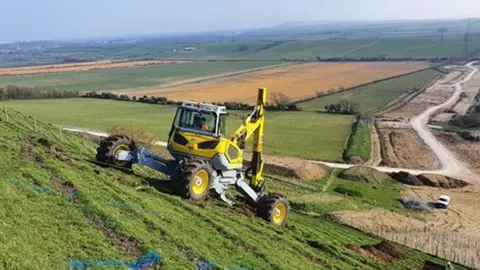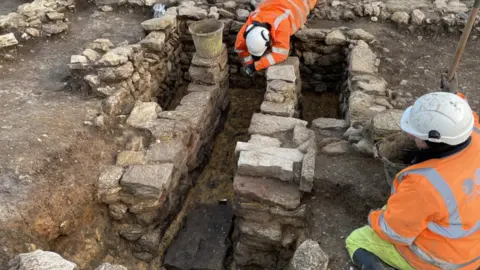Dorset pylon removal: Power cable scheme testing due to complete
 National Grid
National GridA project to remove electricity pylons from a protected landscape and bury power cables underground will reach a milestone this week.
The National Grid is replacing 22 pylons and 5.4 miles (8.6km) of wires in Dorset's Area of Outstanding Natural Beauty (AONB), near Winterbourne Abbas.
Full circuit testing of the cables is due to complete by Tuesday.
In 2021, excavations ahead of the work led to archaeological discoveries dating back 6,000 years.
A Roman settlement was uncovered, as well as Neolithic and Bronze Age finds.
The oldest artefacts were flint tools and pottery from about 4,000 BC.
More than 25 researchers from Oxford Archaeology spent 22 months carrying out investigations, focusing on six locations along the route west of Dorchester.
 Oxford Archaeology
Oxford ArchaeologyNow, with all cables laid, National Grid has also been working to restore the site to the way it was before work began.
Paul Hamnett, senior project manager for National Grid, said: "The steep slopes of the Dorset AONB are part of what makes this landscape so beautiful, but they have also challenged our team.
"One particular incline was so steep, we had to bring in a specialist machine more at home on the Alps in Switzerland."
He explained the team had to anchor a spider digger to Corton Hill during the operation.
Tom Munro, manager for the Dorset AONB Partnership, said it was a "big step forwards".
He added: "It's been great to see this world-first project progress first hand and I'd like to thank all those involved for their expertise and support in our shared goal of enhancing the natural beauty of this special place."
The pylons are due to be removed later this year.

Follow BBC South on Facebook, Twitter, or Instagram. Send your story ideas to [email protected].
